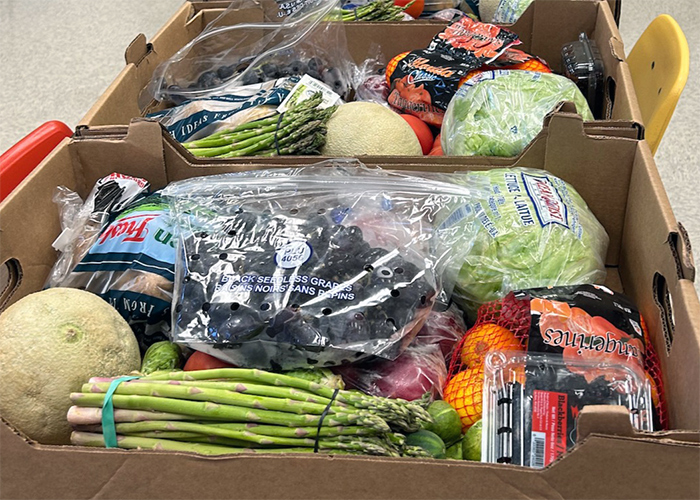Although many households in Kansas are near fields that produce crops, they’re additionally possible a part of an space that’s formally a meals desert. Meals deserts are geographic areas the place residents don’t have entry to inexpensive, wholesome meals choices (particularly contemporary vegetables and fruit) as a result of they don’t stay inside 10 miles of a giant meals retailer. That is true in lots of low-income city areas, however in Kansas, an agricultural state, meals deserts are a significant difficulty in rural and frontier areas as nicely.
As a result of so many farms in Kansas develop commodity crops reminiscent of soybeans, wheat and area corn, there may be little number of edible contemporary meals reminiscent of inexperienced beans, carrots and spinach accessible for buy within the communities surrounding them. With residents’ restricted entry to more healthy meals, power illnesses are persistent in these areas. Kansans dwelling within the “breadbasket of America” have considerably increased charges of diabetes, colon most cancers and coronary heart illness — and after a lifetime of extremely processed, high-fat and high-sugar meals, they’re extra prone to have poor outcomes when experiencing a well being emergency.
Kristina Bridges, Ph.D., analysis assistant professor within the Division of Household Medication and Neighborhood Well being on the College of Kansas Medical Heart, has been on this difficulty for a very long time. She grew up in Southern California, surrounded by quite a lot of contemporary vegetables and fruit. In highschool she was dwelling in a rural space within the Missouri Bootheel, the place contemporary meals weren’t as plentiful.
Bridges earned a doctorate in microbiology at KU Medical Heart, however she had a big curiosity in vitamin, taking further graduate programs in that division. That’s what led her to pursue meals safety analysis — and the way vitamin impacts the general well being in populations with little entry to wholesome meals. Her research of micro organism and colon most cancers in racial ethnic minority teams led to additional analysis about weight loss plan, entry to wholesome meals and the causes of well being inequities.
In 2017, her analysis resulted in an inventory of questions that each one sufferers inside The College of Kansas Well being System are requested throughout visits with their docs. “We requested if the affected person anxious about entry to meals of their family,” she stated. “We checked out those that answered ‘sure’ and in addition had underlying points like pre-diabetes and Sort 2 diabetes.”
With assist from a grant from the W.Ok. Kellogg Basis, the researchers reached out to the sufferers in Wyandotte County and offered them with meals packing containers, linked them with sources in the neighborhood and continued to be taught in regards to the circumstances limiting their entry to meals. Simply as that pilot program was taking off, COVID-19 hit, and the undertaking shifted to purchasing contemporary meals and delivering meals packing containers to those that couldn’t go away their properties to buy.
“We realized lots from the info we collected,” Bridges stated. “It was proof that it’s necessary for our communities to have any such construction arrange in case of emergencies or catastrophic occasions so we might know easy methods to react and assist essentially the most weak individuals.”
A brand new grant to fund analysis on Kansas meals deserts
In 2022, Bridges’ earlier analysis caught the attention of the Aspen Institute, a nationwide non-profit devoted to constructing stronger communities. Now they’ve funded a brand new undertaking in six Kansas areas, together with western and southeast Kansas, Wichita, Lawrence and Topeka — areas that meet federal necessities to be thought-about meals deserts.
The purpose is to learn to overcome the boundaries to wholesome meals. “The grant pays for meals, but it surely additionally funds well being staff and helps individuals with meals insecurity hook up with sources that exist, whereas working with stakeholders to give you higher options,” Bridges stated.
Concepts which have emerged from the undertaking embody cooking courses and dealing with native eating places to offer pre-made meals. One other thought is offering frozen vegetables and fruit, however that plan has been restricted attributable to transportation and storage points. Every of the six communities will proceed to work together and share concepts as new challenges and contemporary options come up.
Bridges famous that the analysis will observe three main outcomes over not less than three months: A1C ranges, blood sugar ranges and weight. The thought is to make a distinction in diabetes, which is prevalent in rural areas of the nation.
“Ultimately we hope to promote these concepts to payers like Medicare, Medicaid and different insurance coverage firms,” Bridges stated, “by displaying them how reimbursing meals transportation bills is cheaper than paying to deal with long-term illnesses.”

